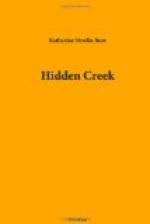“Know any one in this city?”
“No, sir, not rightly. I’ve made acquaintance with some of the waiters. They’ve asked me to join a club. But I haven’t got the cash.”
“What pay do you draw?”
Dickie named a sum.
“Not much, eh? But you’ve got your tips.”
“Yes, sir. I pay my board with my pay and live on the tips.”
“Must be uncertain kind of living! Where do you live, anyway? What? Here?”
They had crossed Washington Square and were entering a tall studio building to the south and east. Dickie climbed lightly up the stairs. Lorrimer followed with a feeling of bewilderment. On the top landing, dimly lighted, Dickie unlocked a door and stood aside.
“Just step in and look up,” he said, “afore I light the light. You’ll see something.”
Lorrimer obeyed. A swarm of golden bees glimmered before his eyes.
“Stars,” said Dickie. “Down below you wouldn’t hardly know you had ’em, would you?”
Lorrimer did not answer. A moment later an asthmatic gas-jet caught its breath and he saw a bare studio room almost vacant of furniture. There was a bed and a screen and a few chairs, one window facing an alley wall. The stars had vanished.
“Pretty palatial quarters for a fellow on your job,” Lorrimer remarked. “How did you happen to get here?”
“Some—people I knowed of once lived here.” Dickie’s voice had taken on a certain remoteness, and even Lorrimer knew that here questions stopped. He accepted a chair, declined “the makings,” proffered a cigarette. During these amenities his eyes flew about the room.
“Good Lord!” he ejaculated, “is all that stuff your copying?”
There was a pile of loose and scattered manuscript upon the table under the gas-jet.
“Yes, sir,” Dickie smiled. “I was plumb foolish to go to all that labor.”
Lorrimer drew near to the table and coolly looked over the papers. Dickie watched him with rather a startled air and a flush that might have seemed one of resentment if his eyes had not worn their impersonal, observing look.
“All poetry,” muttered Lorrimer. “But some of it only a line—or a word.” He read aloud,—“‘Close to the sun in lonely lands—’ what’s that from, anyway?”
“A poem about an eagle by a man named Alfred Tennyson. Ain’t it the way a feller feels, though, up on the top of a rocky peak?”
“Never been on the top of a rocky peak—kind of a sky-scraper sensation, isn’t it? What’s all this—’An’ I have been faithful to thee, Cynara, after my fashion’?”
Dickie’s face again flamed in spite of himself. “It’s a love poem. The feller couldn’t forget. He couldn’t keep himself from loving that-away because he loved so much the other way—well, sir, you better read it for yourself. It’s a mighty real sort of a poem—if you were that sort of a feller, I mean.”
“And this is ‘The Ballad of Reading Gaol’ And here’s a sonnet, ’It was not like your great and gracious ways’—? Coventry Patmore. Well, young man, you’ve a catholic taste.”




